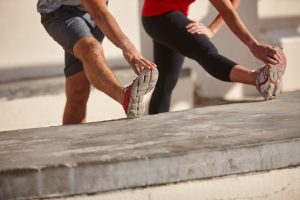After a particularly intense workout, it is common to feel some muscle pain the next day. What can be more challenging is distinguishing between soreness and an injury. Self-diagnosing workout-related aches and pains can be challenging. Visiting orthopedic surgeons can help you get an answer regarding the source of your muscle pain.
Why Do Muscles Get Sore?
During exercise, your muscles must repeatedly contract and relax to propel your body through space. This means that tiny, individual muscle fibers tense and release over and over throughout the exercise period. The process of contracting muscles causes microscopic tears to develop in the muscle tissue. The surrounding connective tissue may also become mildly damaged or inflamed. This microstructural damage to muscle tissue is why muscles feel sore after injury.
 Distinguishing Between Muscle Soreness and a True Injury
Distinguishing Between Muscle Soreness and a True Injury
Feeling sore after your workout actually has a clinical name: delayed-onset muscle soreness. This is most likely to occur following the day in which the intensity or duration of your workouts increased. For example, lifting weights for the first time after a period of inactivity may cause microstructural muscle damage leading to soreness. The most common symptoms of muscle soreness are feeling stiff, slow to move, and pain in the muscles. Your muscles may also feel tender to the touch.
Actual injuries may occur for a variety of reasons, but they often feel different from muscle soreness. For example, pain in the shins may be a sign of shin splints while joint pain may signal a torn tendon or ligament. To determine whether an injury has occurred, it is essential to know your own baseline. If pain or soreness seems out of proportion to your typical experiences, it may be due to an injury. This is particularly true for pain that persists for more than five days.
Treatment for Muscle Soreness or an Injury
Regular muscle soreness diminishes with time. Within two to three days, you should be returning to baseline. Applying hot or cold therapy can help to ease muscle pain. You may also consider taking over-the-counter pain medications to alleviate pain and reduce inflammation. Stretching your muscles, though painful, is another good way to help them heal more quickly.
If your muscle pain persists for more than a few days, it is time to visit Southeast Orthopedic Specialists for a thorough medical assessment. Our Jacksonville orthopedic experts have extensive experience treating injuries characterized by muscle or joint pain. Contact us today to learn how we can help you on your journey toward healing.
Return to Blog